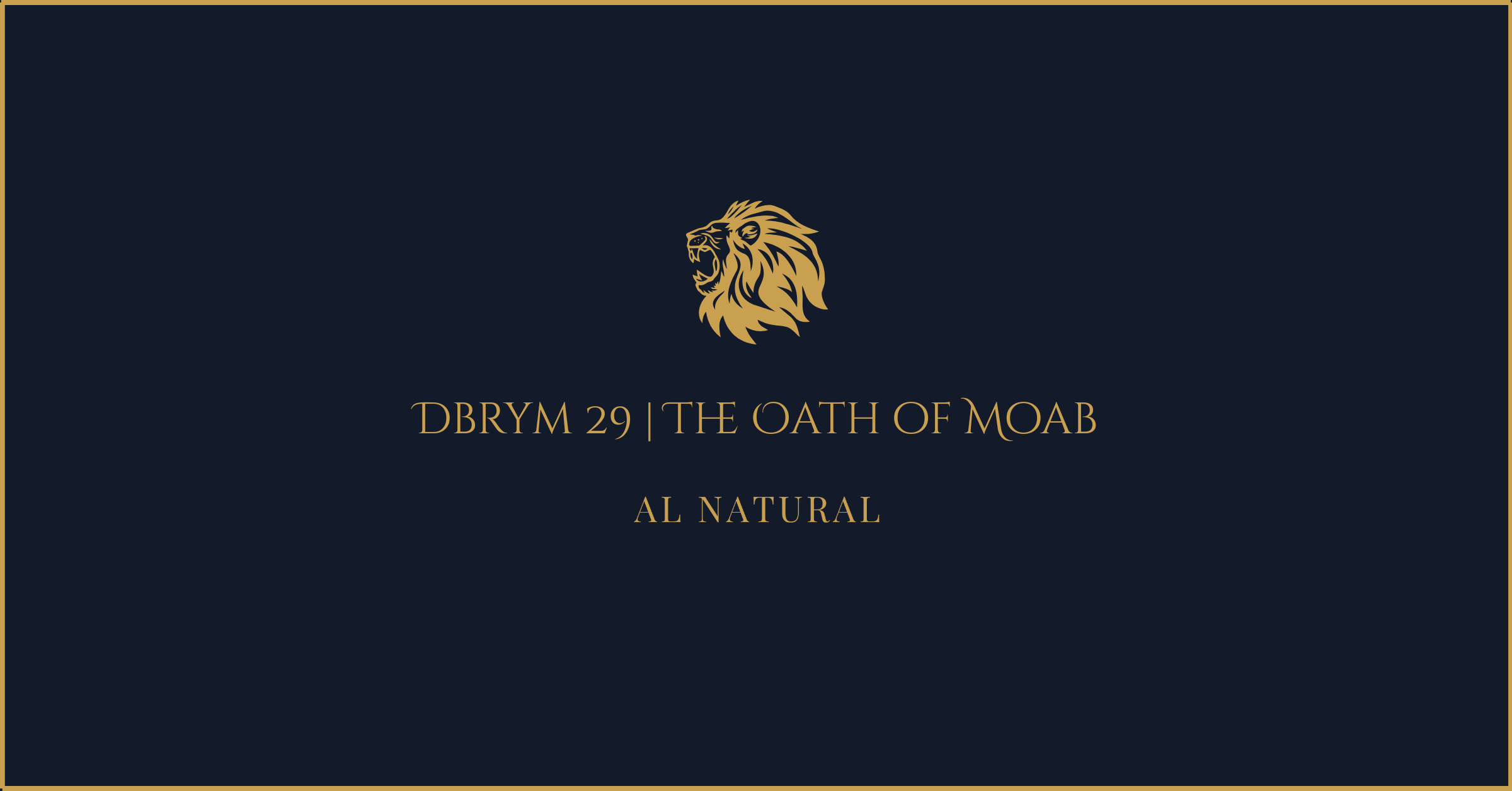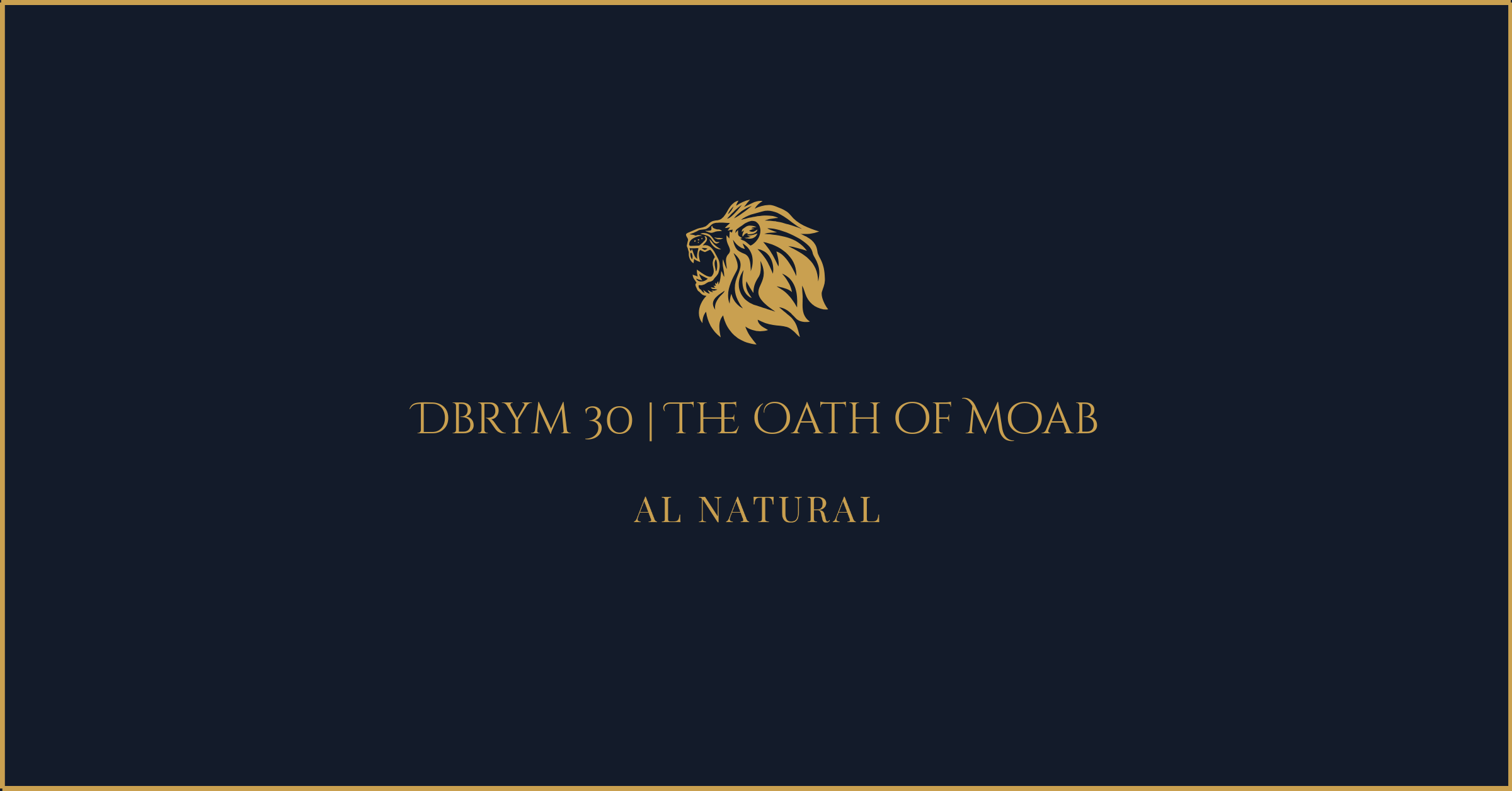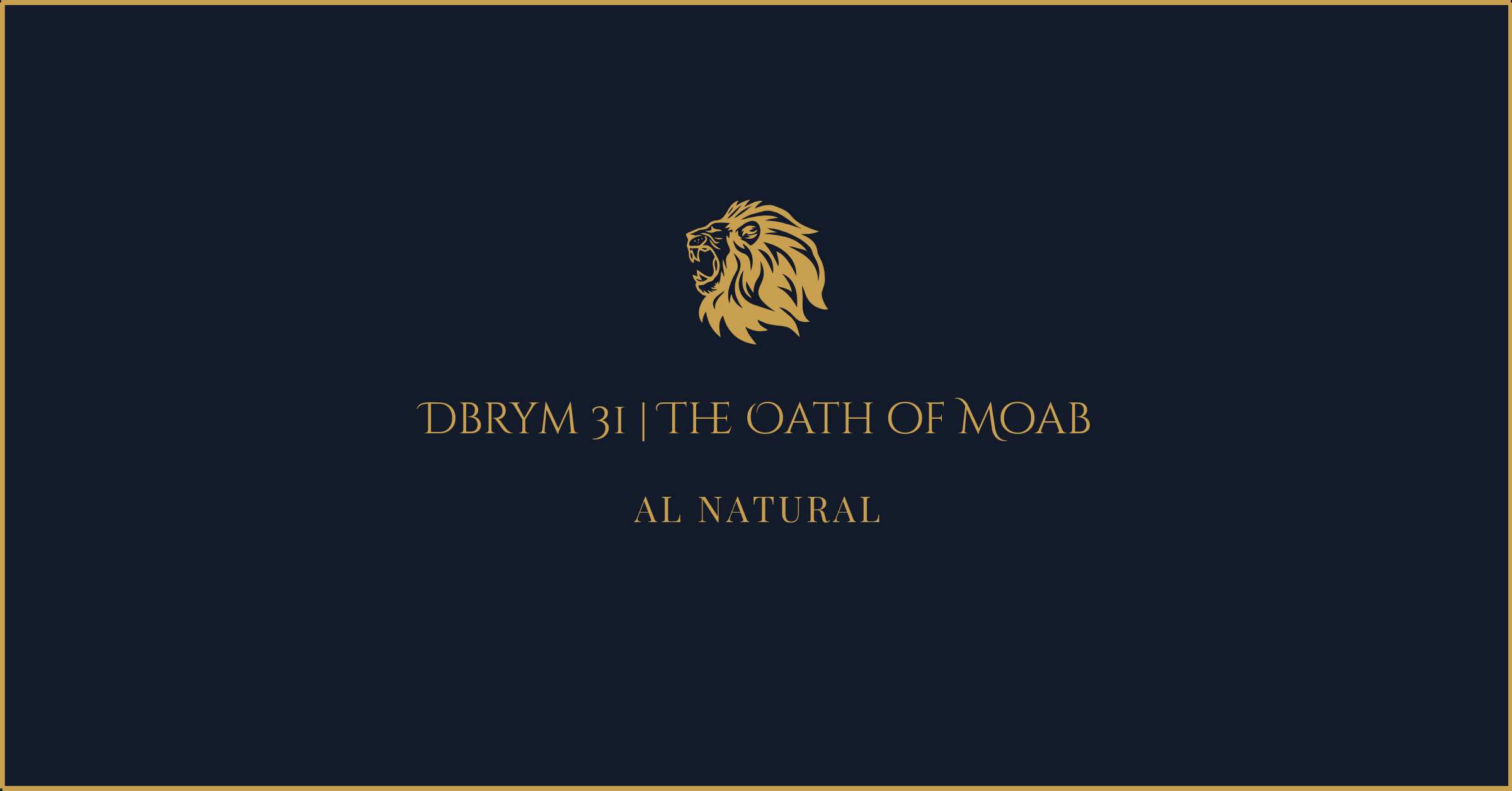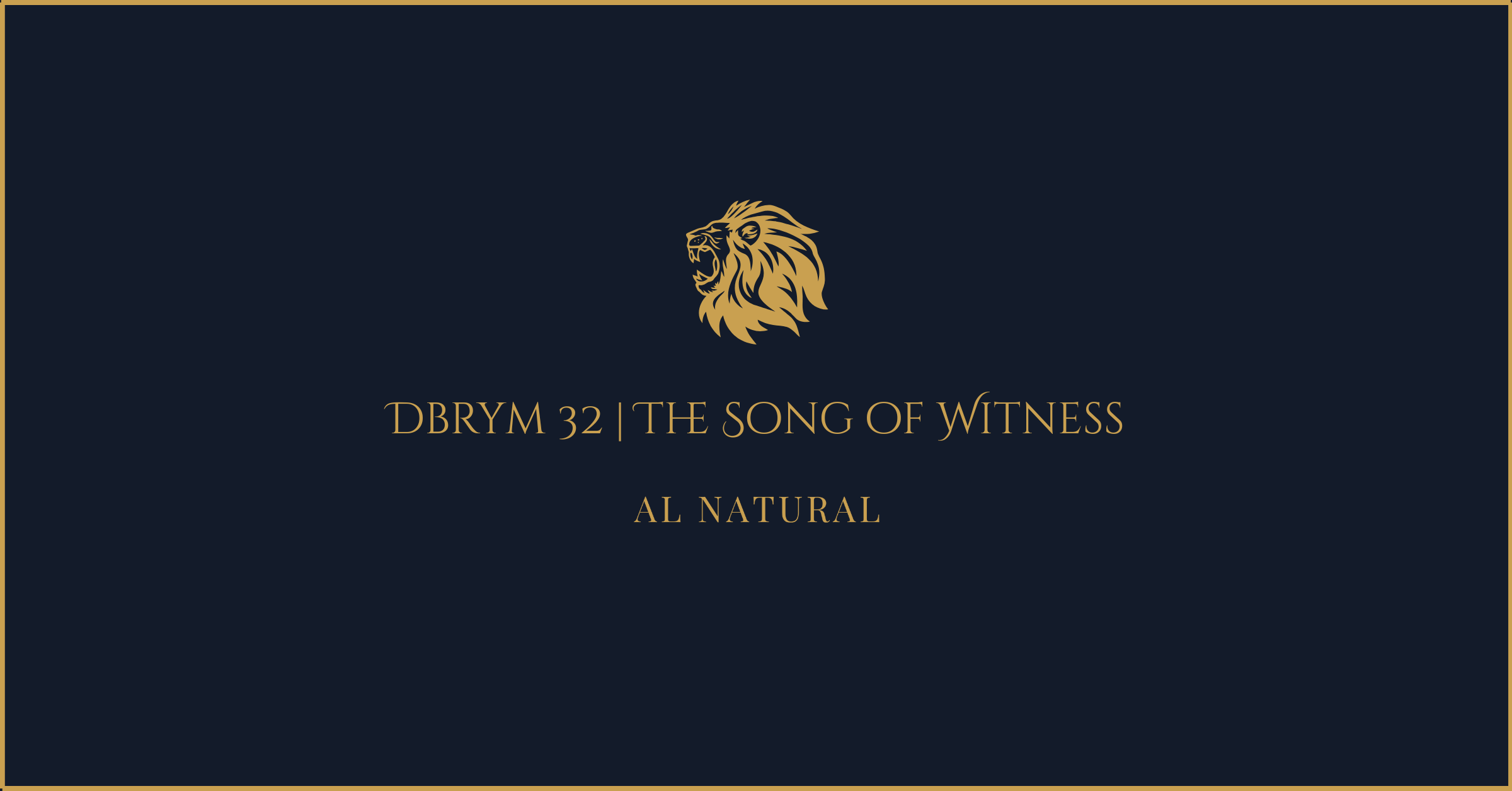Dbrym 27: The Witness Stones and Standards of Righteous Living
Chapter Introduction
Dbrym 27 begins the five-chapter oath sequence (27-31) that binds Yshral to the complete Torah before entering the land. This chapter establishes three critical elements:
- The permanent stone witnesses - Torah written on plastered stones at Mount Aibal
- The altar requirements - Whole unhewn stones for offerings
- The twelve standards of righteous living - Basic laws for human decency that Yshral affirms with "Amen"
Dbrym 27 is about fundamental human decency being tied to the children of Yshral being about to stay in the land they inherited, right rulings like - honoring parents, respecting boundaries, protecting the vulnerable. Yshral voluntarily says "Amen" to each standard, affirming that those who violate these basic laws deserve to be cursed. Mount Aibal receives both the Torah stones and these declarations, while Mount Gerizim stands for blessings - yet no blessings get spoken, only curses receive the "Amen."
Dbrym 27:1-4: Command to Write 12 Instructions (Torah) on Stones
Direct Torah Citation
(1) And Mashah with the elders of Yshral commanded the people, saying, Keep all the commandments which I command you this day. (2) And it shall be on the day when you shall pass over the Yarden unto the land which YHUH your ALuhym gives you, that you shall set up great stones, and plaster them with plaster: (3) And you shall write upon them all the words of this Torah, when you are passed over, that you may go in unto the land which YHUH your ALuhym gives you, a land that flows with milk and honey; as YHUH ALuhay of your fathers has promised you. (4) Therefore it shall be when you have gone over the Yarden, that you shall set up these stones, which I command you this day, in Mount Aibal, and you shall plaster them with plaster.
The Stone Witness Command
Verse 1: Joint Authority Established
"And Mashah with the elders of Yshral commanded the people" - Not Mashah alone but with the elders. This establishes multiple witnesses to the command. The elders share responsibility for ensuring this gets done. No single person can be blamed if Yshral fails to erect these stones.
"Keep all the commandments which I command you this day" - Present tense command with immediate obligation. The word "all" eliminates selective obedience. Mashah delivers these commands "this day" - Yshral cannot claim the commands were unclear or given at different times.
Verse 2: Timing and Method
"On the day when you shall pass over the Yarden" - Specific timing marker. The very day Yshral crosses into the promised land, before conquest or settlement, these stones must be erected. AL YHUH requires immediate witness establishment upon entry.
"Set up great stones, and plaster them with plaster" - Large stones, not small tablets. Plastered to create a smooth writing surface that preserves the text. The plaster makes the writing visible from distance and protects against weathering. These are meant to last as permanent witnesses.
Verse 3: The Instructions to be Written
"You shall write upon them all the words of this Torah" - "This Torah" refers to these specific instructions being given - the twelve standards of righteous living that Yshral will affirm with "Amen." Torah means "instruction" in Hebrew, not a book, the word Torah is used in multiple places in the book and there is no way the whole Torah would fit on large plastered stones, its a common misconception. These particular instructions about basic human decency get plastered on the stones. The complete Torah scroll that Mashah finishes writing gets placed beside the ark in Dbrym 31, but here AL YHUH commands these specific living standards be written publicly.
"When you are passed over" - After crossing, not before. The 12 instructions Yshral agreed to gets inscribed in the promised land itself, marking the land with AL YHUH's law from the moment of entry.
"A land that flows with milk and honey" - The blessing contingent on keeping these instructions. The same stones that record these twelve standards of righteous living also stand in the land given as reward for honoring them. The entire Torah would be too massive to plaster on stones - these are the fundamental living laws Yshral agrees to uphold.
Verse 4: Location Specified
"When you have gone over the Yarden, that you shall set up these stones" - Repetition emphasizes the non-negotiable nature of this command. No delay, no alternate location.
"In Mount Aibal" - The mountain that will echo with curses later in this chapter. Not Mount Gerizim (blessing mountain) but Mount Aibal (curse mountain) receives the Torah stones. The Torah stones stand where the curses are pronounced - a permanent reminder of consequences for violation.
"You shall plaster them with plaster" - Repeated instruction ensures no ambiguity about the method. The plaster is not optional decoration but required for preservation and visibility.
Dbrym 27:5-8: The Altar of Whole Stones
Direct Torah Citation
(5) And there shall you build an altar unto YHUH your ALuhym, an altar of stones: you shall not lift up any iron tool upon them. (6) You shall build the altar of YHUH your ALuhym of whole stones: and you shall offer burnt offerings thereon unto YHUH your ALuhym: (7) And you shall offer peace offerings, and shall eat there, and rejoice before YHUH your ALuhym. (8) And you shall write upon the stones all the words of this Torah very plainly.
The Altar Requirements
Verse 5: No Iron Tools
"And there shall you build an altar unto YHUH your ALuhym" - Specific location "there" at Mount Aibal where the instruction stones stand. The altar and the witness stones occupy the same space, linking righteous living standards with proper offerings to AL YHUH.
"An altar of stones: you shall not lift up any iron tool upon them" - Natural stones only. No human shaping or improvement. Iron tools represent human manipulation. AL YHUH requires the altar remain as AL YHUH created the stones - unaltered by human craft.
Verse 6: Whole Stones for Offerings
"You shall build the altar of YHUH your ALuhym of whole stones" - Complete, unbroken stones. Not fragments or shaped pieces. The Hebrew "shalem" means complete, perfect, at peace. These whole stones represent the wholeness AL YHUH expects from those who approach Him - complete commitment to the righteous living standards written nearby.
"And you shall offer burnt offerings thereon unto YHUH your ALuhym" - Burnt offerings completely consumed by fire, nothing retained by the offerer. Total dedication matching the total commitment to the twelve standards of human decency Yshral affirms this day.
Verse 7: Peace Offerings and Rejoicing
"And you shall offer peace offerings, and shall eat there, and rejoice before YHUH your ALuhym" - Peace offerings create an oath meal. This is how oaths get sealed - by eating together with the oath-maker. Yshral sits down to eat with AL YHUH at Mount Aibal, sharing a meal that bonds them to these standards of righteous living. Like joining a king at his table to seal an agreement, this meal finalizes the oath. The rejoicing comes from entering this binding relationship with AL YHUH, accepting His standards for honorable living as their own.
Verse 8: Clear Writing Command
"And you shall write upon the stones all the words of this Torah (Instruction) very plainly" - Returns to the inscription command with emphasis on clarity. "Very plainly" means no ambiguity, no fancy script that obscures meaning. These standards of righteous living must be readable by all. The twelve basic laws for human decency cannot be hidden behind complex writing or interpretation - they must be plain for every person to understand their obligations.
Dbrym 27:9-10: This Day You Become the People of AL YHUH
Direct Torah Citation
(9) And Mosheh and the priests the Levites spoke unto all Yshral, saying, Take heed, and hearken, O Yshral; this day you are become the people of YHUH your ALuhym. (10) You shall therefore obey the voice of YHUH your ALuhym, and do His commandments and His statutes, which I command you this day.
The Declaration of the Children of Yshral Becoming AL YHUH's People
Verse 9: Formal Oath Declaration
"And Mosheh and the priests the Levites spoke unto all Yshral" - Joint declaration from both Mosheh the lawgiver and the Levite priests. This establishes multiple witnesses to this critical moment. The priests who will enforce these standards join Mosheh in the declaration.
"Take heed, and hearken, O Yshral" - Formal call to attention. What follows changes their status forever. Both "take heed" (see/observe) and "hearken" (hear/obey) - requiring full engagement of sight and hearing as witnesses.
"This day you are become the people of YHUH your ALuhym" - Present tense transformation. Not future promise but current reality. By agreeing to these standards of righteous living, Yshral becomes AL YHUH's people "this day." The oath meal, the stones, the altar, and their agreement to these twelve standards complete the formal adoption. Before this day, they were delivered from Mitsrayim. Now they become His people through accepting His standards for human decency.
Verse 10: The Oath Obligation
"You shall therefore obey the voice of YHUH your ALuhym" - "Therefore" links obligation to identity. Because Yshral has become His people, obedience follows. The voice of AL YHUH includes these twelve standards they are about to affirm with "Amen."
"And do His commandments and His statutes, which I command you this day" - Mosheh delivers AL YHUH's commandments. The phrase "this day" appears repeatedly, emphasizing the immediate and permanent nature of this transformation. These are not suggestions for future consideration but binding standards effective immediately.
Dbrym 27:11-13: The Two Mountains Division
Direct Torah Citation
(11) And Mosheh charged the people the same day, saying, (12) These shall stand upon Mount Gerizim to bless the people, when you are come over the Yarden; Simeon, and Levi, and Yahudah, and Yissachar, and Yoseph, and Binyamin: (13) And these shall stand upon Mount Aibal to curse; Reuben, Gad, and Asher, and Zebulun, Dan, and Naphtali.
The Tribal Positioning of Yshral
Verse 11: Same Day Command
"And Mosheh charged the people the same day, saying" - Immediate instruction following the declaration of peoplehood. The same day Yshral becomes AL YHUH's people, Mosheh positions them for the blessing and curse ceremony. No delay between identity and accountability.
Verse 12: The Empowering Mountain
"These shall stand upon Mount Gerizim to empower the people, when you are come over the Yarden" - Six tribes positioned on Mount Gerizim for empowering. Note that while positioned to empower, no actual empowering get spoken in this chapter - only the curses receive the "Amen."
The six tribes on Mt. Gerizim: "Simeon, and Levi, and Yahudah, and Yissachar, and Yoseph, and Binyamin" - These include the priestly tribe (Levi), the royal tribe (Yahudah), and Yoseph's birthright. The tribes associated with leadership and empowering stand on the empowering mountain, yet remain silent while only curses get pronounced.
Verse 13: The Curse Mountain
"And these shall stand upon Mount Aibal to curse" - Six tribes positioned on Mount Aibal where the instruction stones and altar stand. The curse mountain becomes the active mountain in this ceremony.
The six tribes on Aibal: "Reuben, Gad, and Asher, and Zebulun, Dan, and Naphtali" - Includes Reuben who lost his birthright for violating his father's bed, and four tribes from the handmaids (Dan, Naphtali, Gad, Asher). These tribes stand where the curses get pronounced and where the standards of righteous living are written on stones. The mountain of accountability becomes the mountain of witness.
Dbrym 27:14-26: The Twelve Standards of Righteous Living
Direct Torah Citation
(14) And the Levites shall speak, and say unto all the men of Yshral with a loud voice, (15) Cursed be the man that makes any graven or molten image, an abomination unto YHUH, the work of the hands of the craftsman, and puts it in a secret place. And all the people shall answer and say, Amen. (16) Cursed be he that dishonors his father or his mother. And all the people shall say, Amen. (17) Cursed be he that removes his neighbor's landmark. And all the people shall say, Amen. (18) Cursed be he that makes the blind to wander out of the way. And all the people shall say, Amen. (19) Cursed be he that perverts the judgment of the stranger, fatherless, and widow. And all the people shall say, Amen. (20) Cursed be he that lies with his father's wife; because he uncovers his father's skirt. And all the people shall say, Amen. (21) Cursed be he that lies with any manner of beast. And all the people shall say, Amen. (22) Cursed be he that lies with his sister, the daughter of his father, or the daughter of his mother. And all the people shall say, Amen. (23) Cursed be he that lies with his mother in law. And all the people shall say, Amen. (24) Cursed be he that smites his neighbor secretly. And all the people shall say, Amen. (25) Cursed be he that takes reward to slay an innocent person. And all the people shall say, Amen. (26) Cursed be he that confirms not all the words of this law to do them. And all the people shall say, Amen.
The Twelve Standards Right Living Standards Yshral Affirms to Keep
Verse 14: The Levites Proclaim
"And the Levites shall speak, and say unto all the men of Yshral with a loud voice" - The Levites, as priests responsible for teaching these standards, speak with a loud voice ensuring every person hears. No one can claim they didn't hear or understand.
The Levites now proclaim the basic standards of human decency.
Verse 15: First Standard, No Secret Idols
"Cursed be the man that makes any graven or molten image" - First standard addresses loyalty to AL YHUH alone. Carved or cast images representing other mighty ones violate the fundamental relationship. "The work of the hands of the craftsman" - human creation replacing the AL YHUH. "Puts it in a secret place" - hidden idolatry, maintaining appearance of loyalty while secretly serving other mighty ones. Yshral says "Amen" - agreeing that secret idolatry (or any idolatry) deserves cursing.
Verse 16: Second Standard, Honor Parents
"Cursed be he that dishonors his father or his mother" - Basic human decency begins with honoring those who gave you life. The Hebrew "qalal" means to make light of, treat as insignificant. This can be seen as not making them important, making light of them or disregarding. Yshral affirms with "Amen" that dishonoring parents violates fundamental righteousness.
Verse 17: Third Standard, Respect Property Boundaries
"Cursed be he that removes his neighbor's landmark" - Moving boundary stones to steal land. This theft happens secretly, gradually, hoping no one notices. Yshral agrees with "Amen" that property theft through boundary manipulation deserves cursing.
Verse 18: Fourth Standard, Protect the Vulnerable
"Cursed be he that makes the blind to wander out of the way" - Taking advantage of someone's disability for amusement or gain. Using another's weakness against them, misleading those who are not able to see truth, or rely on Yshral to provide truth, to stumble them on the way violates basic human decency. Yshral's "Amen" confirms this cruelty deserves judgment.
Verse 19: Fifth Standard, Justice for the Helpless
"Cursed be he that perverts the judgment of the stranger, fatherless, and widow" - Three categories without protection or advocacy. Denying justice to those who cannot defend themselves. Yshral's roles is as 'Priest' not tyrant. Yshral holds protection function for the vulnerable for AL YHUH. Yshral affirms with "Amen" that corrupting justice for the helpless brings deserved cursing.
Verse 20: Sixth Standard, Respect Sexual Boundaries
"Cursed be he that lies with his father's wife; because he uncovers his father's skirt" - Taking the father's wife (whether mother or stepmother) violates both sexual boundaries and paternal honor. "Uncovers his father's skirt" means exposing the father's nakedness through this act. Reuben lost his birthright for this exact violation. Yshral says "Amen" to this standard.
Verse 21: Seventh Standard, No Bestiality
"Cursed be he that lies with any manner of beast" - Mixing human and animal violates creation order. Any type of beast, no exceptions. Yshral agrees with "Amen" that this deserves cursing.
Verse 22: Eighth Standard, No Incest with Sisters
"Cursed be he that lies with his sister, the daughter of his father, or the daughter of his mother" - Whether full sister or half-sister, this violates family boundaries. Yshral affirms with "Amen" that incest brings rightful cursing.
Verse 23: Ninth Standard, No Relations with Mother-in-Law
"Cursed be he that lies with his mother in law" - This would steal another man's wife (the father-in-law's). Not about blood relation since they aren't blood related, but about violating marriage bonds and taking what belongs to another man. Yshral says "Amen" to maintaining these marriage boundaries.
Verse 24: Tenth Standard, No Secret Violence
"Cursed be he that smites his neighbor secretly" - Hidden attacks, ambush, striking when the victim cannot defend. Cowardly violence done in darkness. Yshral agrees with "Amen" that secret violence deserves open cursing.
Verse 25: Eleventh Standard, No Blood Money
"Cursed be he that takes reward to slay an innocent person" - Murder for hire, killing for payment. Taking money to shed innocent blood. This includes any system that profits from death of the innocent - whether direct assassination or institutional systems that receive payment when innocent or uninformed people die. Yshral affirms with "Amen" that profiting from innocent death brings justified cursing.
Verse 26: Twelfth Standard, Complete Obedience
"Cursed be he that confirms not all the words of this law to do them" - The summary standard that encompasses everything. Not just knowing but doing. Not selective obedience but "all the words." This final "Amen" from Yshral confirms their agreement to complete obedience to these standards of righteous living. Partial obedience equals disobedience.
Dbrym 27 Summary
Dbrym 27 opens the Oath of Moab ceremony with twelve standards of righteous living that AL YHUH expects from any decent being. These are not complex religious requirements but basic decency, honor your parents, don't mislead the blind, don't take blood money, don't steal land, protect the vulnerable.
Standards that any honorable person would recognize as right.
Yshral had these written on large, unmoveable plastered stones at Mount Aibal as permanent witnesses to remind them of the day they ate with AL YHUH and received the best land on earth. When Yshral kept these right living standards they agreed to, AL YHUH gave them empowering beyond what they could imagine. For Yshral to end up completely annihilated in the chapters to come means they abandoned any semblance of good after being given everything. The same day Yshral became AL YHUH's people (verse 9), they stood between two mountains and said "Amen" twelve times, agreeing that anyone who violates these basic standards deserves to be cursed.
The children of Yshral became their own judges, affirming these were righteous standards worth upholding.
The opening ceremony of the Moab oath establishes the foundation before the detailed empowering and curses of chapter 28. By starting with these twelve standards, AL YHUH shows that His expectations of remaining in the land of Yshral as a nation begins with basic human decency, treating others with respect, maintaining sexual boundaries, dealing honestly, protecting the weak.
These are not burdensome religious rules but the minimum standards for living together in righteousness.
The tragedy that unfolds in the following chapters is that Yshral, who stood this day and said "Amen" to each standard, would violate every single one. The nation that agreed murderers-for-hire deserve cursing would themselves shed innocent blood. Yshral who affirmed that misleading the blind deserves judgment would themselves lead the vulnerable astray.
The plastered stones at Mount Aibal stood as a witness testimony for the children of Yshral and the generations to follow, Yshral agreed these were righteous standards, then chose to violate them anyway.
The Oath of Moab continues through the next four chapters (28-31), building from these basic standards to the complete priestly function Yshral accepts. But it begins here, with twelve "Amens" to fundamental human decency, standards so basic that their violation brings deserved cursing from the very people who commit them.
.png)


.png)
.png)



.png)





